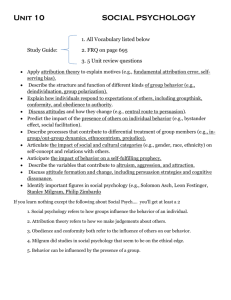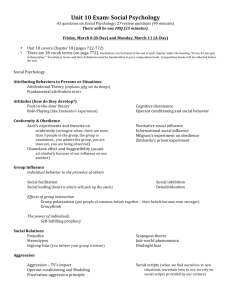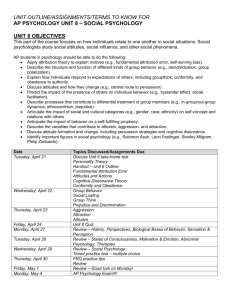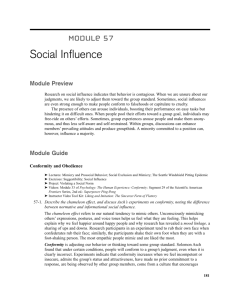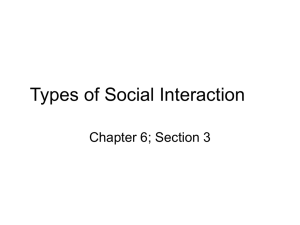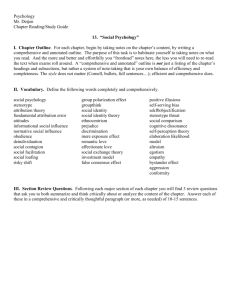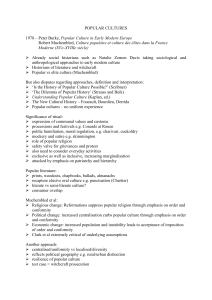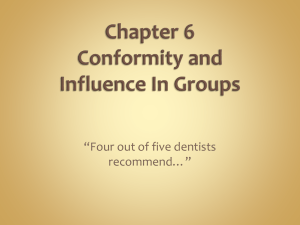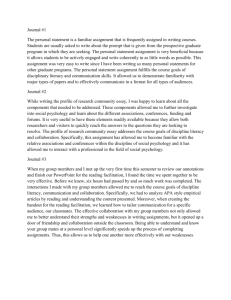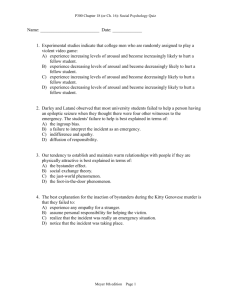Names: Eric Heerschap & Jeff Obara Subject/Grade Level: 11th
advertisement
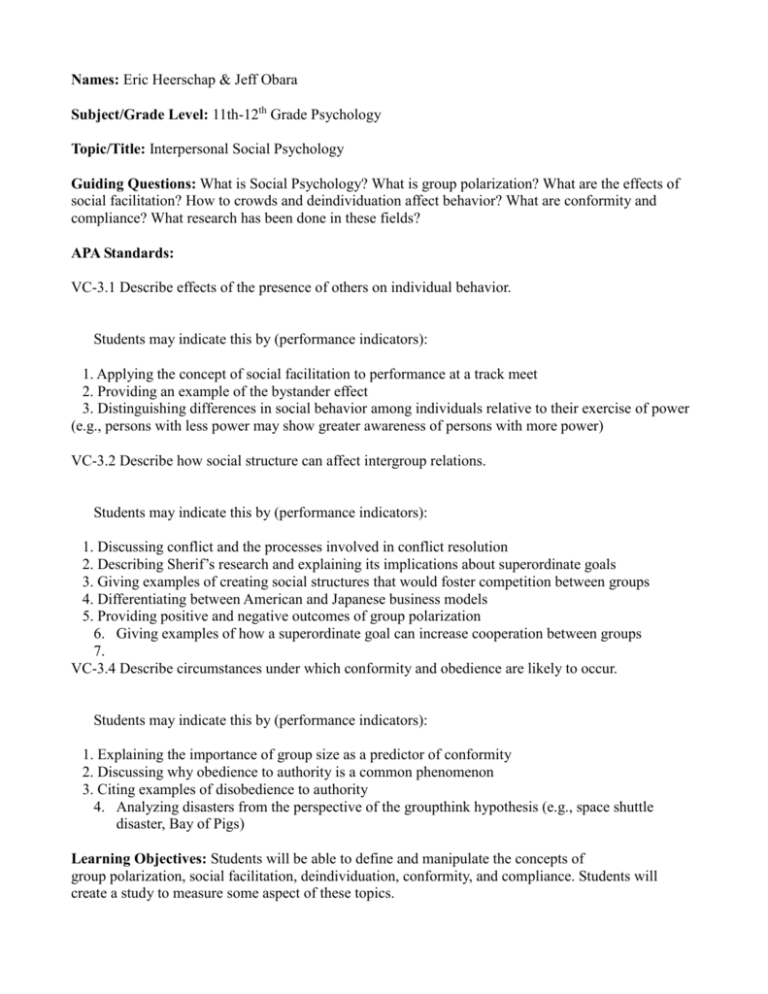
Names: Eric Heerschap & Jeff Obara Subject/Grade Level: 11th-12th Grade Psychology Topic/Title: Interpersonal Social Psychology Guiding Questions: What is Social Psychology? What is group polarization? What are the effects of social facilitation? How to crowds and deindividuation affect behavior? What are conformity and compliance? What research has been done in these fields? APA Standards: VC-3.1 Describe effects of the presence of others on individual behavior. Students may indicate this by (performance indicators): 1. Applying the concept of social facilitation to performance at a track meet 2. Providing an example of the bystander effect 3. Distinguishing differences in social behavior among individuals relative to their exercise of power (e.g., persons with less power may show greater awareness of persons with more power) VC-3.2 Describe how social structure can affect intergroup relations. Students may indicate this by (performance indicators): 1. Discussing conflict and the processes involved in conflict resolution 2. Describing Sherif’s research and explaining its implications about superordinate goals 3. Giving examples of creating social structures that would foster competition between groups 4. Differentiating between American and Japanese business models 5. Providing positive and negative outcomes of group polarization 6. Giving examples of how a superordinate goal can increase cooperation between groups 7. VC-3.4 Describe circumstances under which conformity and obedience are likely to occur. Students may indicate this by (performance indicators): 1. Explaining the importance of group size as a predictor of conformity 2. Discussing why obedience to authority is a common phenomenon 3. Citing examples of disobedience to authority 4. Analyzing disasters from the perspective of the groupthink hypothesis (e.g., space shuttle disaster, Bay of Pigs) Learning Objectives: Students will be able to define and manipulate the concepts of group polarization, social facilitation, deindividuation, conformity, and compliance. Students will create a study to measure some aspect of these topics. Lesson Content Social psychology is the study of how the presence of other people affects thoughts and behavior. Group polarization is the phenomenon that people in groups make more extreme decisions than people alone. Social facilitation is the increase in the dominant response in the presence of others. An audience tends to make familiar easy tasks easier to perform well, while strange or difficult tasks are done less easily and worse. Michaels et. al. (1982) showed that expert pool players made a higher percentage of shots while being observed rather than alone, while novice players made a lower percentage of shots while being observed. Deindividuation is the increased feeling of anonymity in a crowd that leads to diffused responsibility and more potentially dangerous behavior. It can also occur when one's identity is concealed. Zimbardo (1969) showed that when dressed in oversized lab coats and hoods, participants were willing to give more intense shocks to confederates than were participants wearing normal clothes with name tags. Conformity is the phenomenon of unintentionally behaving or thinking like the group. Group size and unanimity of group thought/behavior are very important when considering the strength of the pressure to conform. Asch (1958) showed that when other members of a group unanimously give a false answer to an obvious question, participants give the same false answer 32% of the time (compared to 2% for alone participants.) Compliance is acting in accordance to the request of another. The pressure to comply relies on dimensions such as the status of the requester, guilt, and the likability of the requester. Bochner and Insko (1966) showed that students were more likely to comply to agree to the optimal amount of sleep if told so by a renowned sleep psychologist rather than a YMCA instructor. Student Grouping: In the first activity, students will be grouped according to similar responses to the statement “tests are an extremely important form of assessment.” The second groups will be created randomly by counting everyone 1-4 and assigning the four groups to come up with a way to study deindividuation, social facilitation, conformity, and compliance. Methods -Lecture with videos Likert scale and grouping Group investigation on how to study social psychology topics Activities -Opening activities -Present the statement “Tests are an extremely important form of assessment” -Ask students to write on a sheet of paper a number 0-10 (Likert Scale) their level of agreement (0 being completely disagree, 5 being neutral, 10 being completely agree) Collect students' numbers, and ask everyone who answered 0-4 to sit on the left side of room, and everyone who answered 6-10 to sit on the right, and everyone who answered 5 to remain in the middle. - Groups will discuss for 2 minutes why they answered the way they did, and will be asked to come up with a group Likert number to the same statement and share Students return to seats for lecture -Main Activities Powerpoint lecture will be given Introduce Social Psychology Define “groups” Discuss how groups affect behavior Define group polarization Compare groups' average ratings before 2 minute discussion and their collective answer after. Show how this either does or does not demonstrate group polarization. Present on Social facilitation and Michaels (1982) Present on Deindividuation and Zimbardo (1969.) Present on Conformity and show Asch video Present on Compliance and Bochner and Insko (1966) Closing activities Students will be divided into 4 groups by numbering them 1-4 and having like numbers gather. Each group will be assigned to devise a way to study some aspect of either social facilitation, deindividuation, conformity, or compliance Groups are given 5-10 minutes to create a study Groups share their studies IMPORTANT QUESTIONS TO ASK? MATERIALS? Assessment Students will be assessed on their studies. The studies will be assessed based on the correctness, relevance to social psychology, inventiveness, and completeness. To avoid social loafing, students will be asked to rate other members of their group on their participation or lack thereof. EVALUATION RATIONALE? POINTS FOR WRITTEN LESSON PLAN 7/10 You are missing a few very important sections. At this point in the semester, this shouldn’t be happening. Please refer to the template that is provided in your syllabus and on our course website for guidance in this area. I would also ask that you put a little bit of work into formatting. It just makes the lesson clearer and easier to follow in the event that someone would like to use it. Refer to my comments throughout for more detailed feedback. POINTS FOR ENGAGING PRESENTATION STYLE /5 I like your opening exercise. Perhaps you could write the statement on the front board or on a slide? Nice adjustment when one group was a little too large. It’s important to be prepared for this. POINTS FOR DISCUSSION WITH CLASS Thank you /5 TOTAL POINTS Great work, /20
